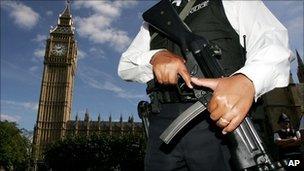Police and MI5 'ready for new terror powers'
- Published

Control orders were introduced under the former Labour government in 2005
The government has insisted that MI5 and the police will be ready to monitor terror suspects under a revamped system as soon as new laws are passed.
Labour says it fears officers will not have the necessary resources to implement the Terrorism Prevention and Investigation Measures (TPims).
But Security Minister James Brokenshire told MPs he was confident the transition would be well-managed.
TPims are due to replace control orders at the end of this year.
The measures are used against suspects who have not been charged with an offence, and ministers say the new system is a better balance between monitoring individuals and allowing them reasonable liberties.
The power to move a suspect to a new home was ditched from the TPims bill before Parliament , externalfollowing a review by the coalition government.
But last week ministers announced that draft emergency measures, external would be added to the bill to reintroduce relocation in exceptional circumstances.
'Satisfied'
Opening the report stage and third reading of the TPims legislation in the Commons, Mr Brokenshire said the measures would replace control orders the day after the bill was given royal assent.
He said that over the summer he visited Metropolitan Police officers responsible for managing terror suspects, and they had "confirmed arrangements will be in place to effectively manage the transition from control orders to TPim notices when they become effective".
"It would be irresponsible for the government to introduce the new system when it was not safe to do so," he said.
"The government would not take such a risk in terms of the introduction of this new regime if it was not satisfied as to the steps and approaches being taken by the Metropolitan Police Service and the Security Service."
But shadow Home Office minister Shabana Mahmood told the Commons there remained "uncertainty" about the agencies' readiness.
She said: "We have very real concerns about the way in which the additional resources that the police have said will be required under this regime - which were not required under the control order regime because there is a higher risk under TPims - how they will be deployed, how they will come online ready for the police to use."
Labour's former communities secretary Hazel Blears said Met Police deputy assistant commissioner Stuart Osborne told a Commons committee investigating TPims that time was needed.
She quoted him as saying: "To get the resources we anticipate we need will take more than a year in terms of being able to get people trained, get the right equipment.
"Until we have got that, we won't be able to start to bed things in and see how it works."
'Illogical'
Labour MPs want the government to reinsert the relocation power into the main TPim bill, and have called the emergency measures a dangerous fudge.
Ms Mahmood told the Commons: "It is extremely unacceptable for legislation to be conducted in this way.
"Either these are control order powers that are needed, or they are not."
She said the bill had taken MPs round in a circle, back to "exactly where we started - control orders", adding: "The government should have been honest and admitted that sometimes stringent measures - control order measures such as relocation, such as 16-hour curfews - are necessary."
Ms Blears, a former Home Office minister, said the "illogical" decision to remove the power of relocation was "a political accommodation designed to enable the Liberal Democrat part of the coalition to save face and say that they've done some kind of deal".
Lib Dem home affairs spokesman Tom Brake said he could not "envisage the extraordinary circumstances that would apply in which relocation powers would be acceptable".
The attempt by Ms Blears to insert relocation powers was defeated by 340 votes to 213.
Mr Brokenshire said the government believed it was right that the more stringent powers were not on the statute book or available at all times, but were contained in draft emergency legislation that was introduced only if required.
- Published1 September 2011
- Published26 January 2011
- Published26 January 2011
- Published26 January 2011